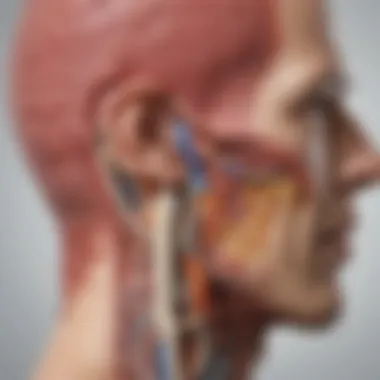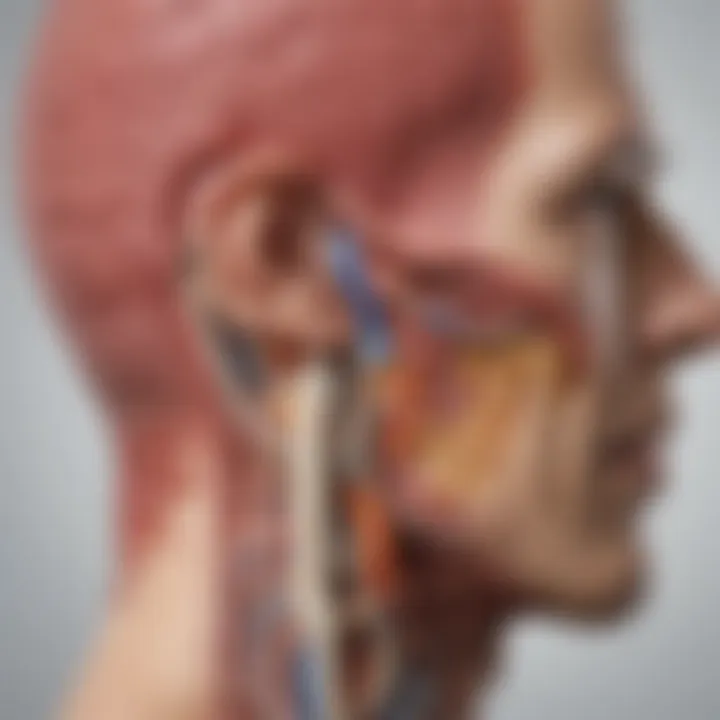Understanding How Pituitary Tumors Affect Memory Loss


Intro
Pituitary tumors, often overshadowed by other more common brain ailments, hold significant sway over our cognitive faculties, particularly memory. These growths have the potential to affect various aspects of brain function, leading to memory loss and cognitive decline. Understanding the relationship between pituitary tumors and cognition is crucial, not just for the medical community but also for patients and their families grappling with the implications of such diagnoses. This article delves deep into this nuanced topic, unraveling the complex web that links these tumors to memory impairment.
Overview of Research Topic
Brief Background and Context
The pituitary gland, although small, is often termed the "master gland" of the body due to its crucial role in regulating hormonal activities. Located at the base of the brain, it influences growth, metabolism, and a range of psychological functions. When tumors develop in this gland—be they benign adenomas or more sinister neoplasms—their impact can ripple through various systems, including cognition.
Historically, research has shed light on physical manifestations of pituitary tumors, such as hormonal imbalances. However, cognitive side effects, particularly memory disturbances, have only recently begun to receive the attention they rightly deserve. This oversight is surprising given the intimate links between hormonal changes and cognitive functions.
Importance in Current Scientific Landscape
With an increase in diagnostic capabilities, more individuals are being identified with pituitary tumors today than in previous decades. Such developments underscore the need for better comprehension of how these tumors influence cognitive functions, particularly memory. New studies suggest that memory loss doesn't only stem from tumor pressure or surgical removal but also from the hormonal fluctuations that follow.
In light of these factors, this exploration aims to enlighten readers on the mechanisms at play, the symptoms to be aware of, and potential approaches to treatment and management of cognitive decline. Such insights are vital not just for enhancing our understanding, but also for improving patient outcomes and experiences.
Methodology
Research Design and Approach
A multi-faceted research design is critical to paint a comprehensive picture of the impacts of pituitary tumors on memory. By integrating qualitative analyses of patient reports with quantitative measures from cognitive assessments, the findings can reflect a more accurate scenario. Longitudinal studies that track cognitive functions over time before and after treatment can offer valuable insight regarding the fluctuations in memory associated with different therapeutic approaches.
Data Collection Techniques
Data collection can vary significantly, encompassing a broad array of methodologies:
- Clinical interviews: Engaging with patients to gather personal memories of changes in cognitive function.
- Neuropsychological testing: Assessing memory& cognitive abilities pre- and post-treatment to establish a baseline and observe any changes.
- Hormonal assays: Understanding the levels of key hormones pre- and post-surgery or intervention to correlate with cognitive test outcomes.
Through the union of these methods, a more vivid image can emerge regarding the efficacy and effects of pituitary tumor management on memory.
"Memory is the treasure-house of the mind wherein the monuments thereof are kept and preserved." - Thomas Fuller.
Culmination of the Section
By laying a thorough foundation with careful research methodologies, we can begin to peel back the layers of understanding how pituitary tumors influence memory. This knowledge can amplify efforts towards more personalized patient care, ultimately leading more people toward improved cognitive health even in the face of such challenging health issues.
Preface to Pituitary Tumors
Understanding the impact of pituitary tumors on cognitive functions is a pressing issue for both the medical community and the general population. These tumors, while often benign, can lead to significant health complications, particularly with regard to cognition and memory. This section will outline the nature of pituitary tumors, their implications, and why it's critical to discern their effects on memory loss.
To kick things off, let's define what pituitary tumors are. They originate from the pituitary gland, a small but mighty organ located at the base of the brain, responsible for regulating hormones that influence various body functions. When tumors form in or around this gland, they can disrupt hormonal balance and lead to a slew of complications, including cognitive disturbances.
Definition and Types of Pituitary Tumors
Pituitary tumors can be categorized primarily into two types: adenomas and craniopharyngiomas. Adenomas are the most common form; they are typically non-cancerous and segregated into two further categories: functional, which secrete hormones, and non-functional, which do not.
Craniopharyngiomas, on the other hand, can be more invasive, growing in areas near the pituitary gland and surrounding structures. They sometimes demand aggressive treatment approaches. Understanding these distinctions is crucial, as the type and behavior of the tumor can significantly impact cognitive function.
Prevalence and Demographics
Pituitary tumors are not as rare as one may think. Studies indicate that they occur in approximately 1 in 1,000 people, predominantly affecting individuals aged 30 to 60. However, certain demographics, such as women in their reproductive years, display a higher prevalence. It’s worth noting that the increase in detection is partly due to advancements in imaging technologies, like MRI scans, which have enabled the identification of tumors that may have previously gone unnoticed.
Moreover, while the tumors may not directly correlate to significant mortality rates, their effects on quality of life can be profound. From hormonal changes to alterations in cognitive abilities, the impact is widespread, raising questions about long-term care and surveillance.
By exploring the characteristics, prevalence, and types of pituitary tumors, this article aims to lay a solid foundation for understanding their impactful role in memory loss and cognitive dysfunction. The next sections will delve deeper into the mechanisms at play, shedding light on how these tumors can disrupt the complex network of memory and cognition.
Understanding Memory and Cognition
Memory and cognition are fundamental aspects of human experience. They shape the way we perceive the world, interact with others, and function daily. Understanding these concepts is particularly significant when discussing pituitary tumors, as disruptions in normal cognitive function can profoundly impact individuals' quality of life. This exploration requires delving into not only the mechanics of memory itself but also the nuances of how these tumors can affect such critical brain functions.
By dissecting how memory operates, we can better appreciate the challenges faced by those with pituitary tumors. It reveals the intricate relationships among various brain structures and functions. This understanding also provides a pathway to develop effective assessments and treatments, both of which can vastly improve cognitive health in affected individuals.
Anatomy of Memory in the Brain
The brain, a complex organ, houses several structures instrumental to memory processing. Among these, the hippocampus takes center stage. This small, seahorse-shaped region allows for the consolidation of new memories and is vital for navigating the landscape of past experiences. Damage or dysfunction in this area can lead to impaired memory formation, often seen in patients with pituitary tumors.
Other relevant structures include:


- The amygdala: This almond-shaped cluster helps in processing emotions, which plays a role in memory recall, especially emotional memories.
- The prefrontal cortex: Involved in working memory, it assists in decision-making and moderating social behavior. If the pituitary tumor affects this region, patients may struggle with immediate memory tasks.
- The thalamus: Often called the brain's relay center, the thalamus funnels sensory information to various parts of the brain, which can influence how memories are formed.
Such regions may become compromised by the presence of a tumor, leading to disruptions in how memories are processed and retrieved.
Types of Memory: Short-term and Long-term
Memory comes in various forms, primarily classified into short-term and long-term memory. Understanding these types contributes to a fuller picture of how pituitary tumors can cause cognitive decline.
Short-term memory, also known as working memory, involves holding and manipulating information temporarily, usually for a few seconds to minutes. An individual might use short-term memory when remembering a phone number long enough to dial it. This type of memory is vulnerable to disruption, especially when hormonal imbalances or structural changes occur due to a pituitary tumor.
In contrast, long-term memory refers to the storage of information over extended periods, ranging from hours to a lifetime. It divides further into:
- Episodic memory: Memory of specific events and experiences.
- Semantic memory: Knowledge about the world, facts, and concepts.
Patients with pituitary tumors might not only suffer from difficulties with short-term memory tasks, but they can also experience issues recalling facts or past experiences, thereby affecting their daily activities and social interactions.
"Memory is not a disc where you can store data. Rather, it's a tapestry woven from personal narratives and shared experiences."
Through this understanding of memory and cognition, one begins to grasp the far-reaching effects of pituitary tumors. Both the anatomical structures involved and the types of memory emphasize the dire implications of cognitive impairments. Addressing these influences is crucial in the journey toward effective management and treatment.
Mechanisms by Which Tumors Affect Memory
Understanding the mechanisms behind how pituitary tumors affect memory is critical. This section delves into hormonal imbalances and structural changes in the brain, which play significant roles in cognitive functions. Exploring these mechanisms helps elucidate the ways that disruptions in normal brain physiology can lead to challenges in memory.
Hormonal Imbalances Caused by Pituitary Tumors
Pituitary tumors, depending on their nature, can usher in a cascade of hormonal imbalances that significantly impact memory functionality. The pituitary gland, known as the "master gland," produces hormones that regulate several bodily functions, including stress response and metabolism. When a tumor affects this gland's hormonal output, it can lead to conditions like Cushing's disease or hypopituitarism, both of which can detrimentally affect cognition and memory.
- Excess Hormones: Tumors may lead to an overproduction of hormones, especially cortisol. Elevated cortisol levels can damage neurons in the hippocampus, a brain region crucial for memory formation. This is no mere inconvenience; studies have shown that chronic exposure to high cortisol levels correlates with impairments in both short-term and long-term memory.
- Hormonal Deficiencies: Conversely, deficiency in key hormones like growth hormone or sex hormones can lead to an increased risk of cognitive decline. For instance, low estrogen levels in women can be linked to memory problems. Understanding these hormonal changes provides insight into the complex ways that tumors influence cognitive health.
- Behavioral Impacts: The emotional and psychological fallout from dealt with hormonal imbalances can also manifest in unclear thinking and reduced ability to remember facts or events. People often find that their moods contribute to their cognitive performance, and the fluctuations caused by these imbalances further complicate the issue.
Structural Changes in the Brain
The physical impact of pituitary tumors extends beyond hormonal shifts and into the actual structure of the brain. As tumors grow, they can exert pressure on surrounding areas, leading to alterations that impair memory.
- Compression of Brain Structures: As the tumor expands, it may press against nearby tissues, including the courses utilized for memory processing. The physical stress can disturb the normal functioning of the temporal lobes, which are essential for formulating memories. This pressure can result in noticeable memory lapses, leaving individuals feeling as if they are functioning in a fog.
- Neuroinflammation: Tumors can also lead to inflammation within the brain, an adverse reaction that disrupts communication between neurons. This condition is not merely an incidental finding; researchers have identified that neuroinflammation can inhibit synaptic plasticity, the brain's ability to form new memories. Essentially, if the environment in which neurons communicate is compromised, memory retention is greatly at risk.
- Atrophy of Relevant Brain Regions: Over time, structural changes induced by the presence of a tumor could result in atrophy of the hippocampus and other areas vital for memory. This loss of mass not only decays memory function over time but also poses challenges for rehabilitation efforts later on.
In summary, the mechanisms by which pituitary tumors impact memory are multifaceted. Hormonal changes raise a host of issues, while structural changes further impede cognitive functions. Recognizing and understanding these elements is essential for both patients and healthcare providers as they navigate the rocky path of pituitary tumor treatment and recovery.
Common Symptoms of Memory Loss in Patients
Understanding the common symptoms of memory loss associated with pituitary tumors is crucial for anyone navigating the challenges posed by this condition. Memory affects daily life on multiple levels; from simple tasks like recalling where one placed their keys, to more complex situations, such as remembering names in social interactions. Memory loss can disrupt personal relationships and create a sense of confusion in environments familiar to the patient. Therefore, recognizing the signs early can lead to timely interventions and better management strategies.
Types of Memory Loss Associated with Tumors
Memory loss related to pituitary tumors may manifest in various forms, often categorized into different types. Here are some prevalent types:
- Short-term Memory Loss: Patients may struggle to remember recent events, conversations, or the names of people they just met. This kind of loss can frustrate both the individual and their loved ones, leading to misunderstandings.
- Long-term Memory Impairment: While short-term memory issues are more common, some individuals might find that their long-term memories also fade. This might include forgetting significant life events, such as anniversaries or births.
- Declarative vs. Procedural Memory Loss: Declarative memory, which involves the recall of facts and events, can be affected, while procedural memory, such as knowing how to ride a bike, might remain intact. Nevertheless, even procedural memory can be impacted if a patient develops anxiety over performing certain tasks, leading to a decline in confidence.
The exact manifestation can often depend on the tumor's size, its location in the brain, and the degree to which it interferes with surrounding tissues.
Cognitive Decline and Behavioral Changes
Cognitive decline can accompany memory loss in individuals with pituitary tumors, reflecting broader issues in mental function. Changes in cognition may not always be direct but can often encompass behavioral changes. Here is a few notable aspects:
- Difficulty in Concentration: Patients may find it harder to focus on tasks or follow conversations, making them seem disengaged or uninterested, which is often not the case.
- Emotional Instability: Mood swings can arise as a result of cognitive changes. Anxiety, depression, or heightened emotions might emerge unexpectedly, stemming from the patient's struggle with memory loss.
- Social Withdrawal: Due to frustrations or embarrassment stemming from their symptoms, patients may start to isolate themselves from social situations, which can exacerbate their feelings of loneliness.
"Awareness of cognitive and behavioral changes is just as important as recognizing memory loss itself, as together they shape the individual’s experience and overall mental health."
Overall, while memory loss is a key symptom of pituitary tumors, the associated cognitive decline and behavioral changes can considerably alter a patient's quality of life. In understanding these effects, one can begin to appreciate the multifaceted challenges that accompany the medical condition.
Recognition of such symptoms allows for a proactive approach in management, helping patients regain a sense of control over their lives.
Diagnostic Approaches for Memory Issues
When it comes to understanding the connection between pituitary tumors and cognitive functions, pinpointing memory issues is crucial. Diagnosing memory problems is not just about identifying symptoms; it's about tracing them back to their roots, especially when tumors can have subtle yet significant effects. Through accurate diagnoses, we can tailor treatments and rehabilitation more effectively, ultimately helping patients reclaim their lives.
Neurocognitive Assessments
Neurocognitive assessments stand as one of the principal avenues to evaluate how memory is affected by pituitary tumors. These tests employ a blend of standardized measures and cognitive tasks that give insight into different types of memory function. For instance, patients may undergo a series of tasks that assess short-term memory recall and executive functions.


The beauty of these assessments lies in their ability to highlight specific cognitive deficits. They not only identify the areas where a patient is struggling but also provide baseline data that would be useful for monitoring changes over time. Clinicians can learn a lot about the impact of hormonal changes or structural brain alterations due to a tumor by analyzing these results.
"Understanding cognitive functioning is crucial for pinpointing areas in need of support, allowing for a more tailored approach to recovery."
Imaging Techniques: MRI and CT Scans
Imaging techniques such as Magnetic Resonance Imaging (MRI) and Computed Tomography (CT) scans are also instrumental in diagnosing issues related to memory. These imaging modalities allow healthcare providers to visualize the pituitary gland and surrounding structures within the brain.
- MRI: Known for its ability to provide high-resolution images, an MRI can reveal the presence of a tumor, its size, and its impact on adjacent brain tissues. It is particularly useful for assessing soft tissue changes that may affect memory areas in the brain.
- CT Scans: Although less detailed than MRIs, CT scans are often quicker and can serve as initial screening tools. They help clinicians quickly identify gross anatomical issues, whether they are related to tumors or any swelling in the brain that might cause memory problems.
These imaging techniques, in conjunction with clinical histories, provide a comprehensive picture that aids in crafting a focused treatment plan.
Endocrine Evaluations
Pituitary tumors often disrupt hormone production, leading to various endocrine issues that can indirectly affect cognitive functions, including memory. Therefore, endocrine evaluations are another vital diagnostic angle to consider. Blood tests can be conducted to measure hormone levels, assessing for imbalances in critical hormones like cortisol, growth hormone, and prolactin.
- Hormonal Imbalances: These can manifest in ways that may compromise cognitive health. For example, excess cortisol from adrenal stress can impair memory, while low levels of growth hormone might lead to difficulties in learning new information.
- Clinical Relevance: Understanding these hormonal fluctuations not only aids in the diagnosis of cognitive decline but can also inform treatment approaches. For instance, if a specific hormone deficiency is identified, hormone replacement therapy might be warranted, potentially improving cognitive outcomes.
In summary, a thorough approach that integrates neurocognitive assessments, advanced imaging techniques such as MRI and CT scans, and meticulous endocrine evaluations is necessary to track memory issues stemming from pituitary tumors. By utilizing these diagnostic tools, healthcare professionals can gain a clearer understanding of a patient's memory challenges and take significant strides towards effective treatment.
Treatment Options for Pituitary Tumors
Recognizing and addressing pituitary tumors is crucial for mitigating their impact on cognitive functions, particularly memory loss. Treatment options can significantly influence not only tumor size and hormone levels but also the resultant cognitive health of the affected individual. Here, we delve into the different approaches available, each with its specific advantages and considerations that are paramount to patient care.
Surgical Interventions
Surgical options for treating pituitary tumors often take center stage when it comes to direct tumor removal. The primary aim is to excise the tumor while minimizing damage to surrounding brain tissue. Transsphenoidal surgery—a common approach—allows neurosurgeons to access the pituitary gland through the nasal cavity. This method reduces recovery time and can lead to substantial improvements in both hormonal balance and cognitive functions.
Benefits of Surgical Interventions:
- Direct Tumor Removal: Eliminating the tumor can help relieve pressure on critical brain areas responsible for memory and cognition.
- Immediate Effects on Hormones: Many patients notice an improvement in related symptoms, including memory function, soon after surgery.
Nevertheless, surgery isn’t without risks. Complications can occur, including nasal issues, hormonal imbalances post-surgery, or even, albeit rarely, neurological deficits. It’s vital for patients to engage in thorough discussions with their healthcare providers, weighing the pros and cons in context to their specific situations.
Radiation Therapy
Radiation therapy is another cornerstone in the treatment of pituitary tumors, especially for those that are inoperable or partially resected. This approach utilizes targeted radiation to inhibit tumor growth and to reduce hormone overproduction.
One common modality is stereotactic radiosurgery, which precisely focuses intense radiation on the tumor, sparing surrounding healthy tissue. This non-invasive technique can have long-term benefits in managing tumor recurrence and may contribute to cognitive stability over time.
Important Note: While effective, radiation might not show immediate results. Patients often face a waiting period—sometimes months or even years—before they can assess the full impact of the treatment on their cognitive functions.
Considerations Regarding Radiation Therapy:
- Long-term Effects: Though generally well-tolerated, some patients may experience cognitive decline or fatigue as a delayed outcome.
- Monitoring is Essential: Regular follow-ups are critical to assess both tumor response and cognitive health.
Medication to Manage Symptoms
Adjuvant therapy in the form of medication plays a pivotal role in the comprehensive management of pituitary tumors. These medications typically focus on correcting hormonal imbalances and alleviating symptoms associated with pituitary dysfunction.
For instance, dopamine agonists such as cabergoline can effectively shrink prolactin-secreting tumors (prolactinomas) and restore normal function, which in turn can translate into cognitive improvements. Similarly, hormone replacement therapy may be necessary for patients who exhibit deficiencies due to tumor effects or surgical interventions.
Benefits of Medicinal Approaches:
- Symptom Management: Medications can help alleviate cognitive symptoms, such as poor concentration or memory issues, enhancing overall quality of life.
- Combination with Other Treatments: Often, medication works synergistically with surgery and radiation therapy, optimizing patient outcomes.
Ultimately, the choice of treatment should align with individual health profiles and specific tumor characteristics. Collaboration between patients, neurologists, and oncologists is essential to create tailored treatment plans that promote cognitive recovery alongside tumor management.
Post-Treatment Cognitive Rehabilitation
Post-treatment cognitive rehabilitation plays a crucial role for individuals who have undergone treatment for pituitary tumors. These patients often face various cognitive difficulties, particularly with memory, that stem from the tumor's effects and the subsequent treatment. The rehabilitation process is not merely about recovering lost skills; it's about re-establishing a person's capacity to function in their daily lives, regain confidence, and improve their overall quality of life.
The essential elements of post-treatment cognitive rehabilitation include tailored strategies that cater to the unique needs of each patient. Programs focus not only on cognitive deficits such as memory loss but also on emotional wellbeing. This two-pronged approach offers several benefits:
- Restoration of Cognitive Function: Patients engage in exercises designed to enhance their memory, attention, and problem-solving skills.
- Emotional Support: Mental health resources are integrated into rehabilitation programs to help patients navigate their feelings of frustration or anxiety regarding cognitive decline.
- Adaptive Strategies: Education on how to compensate for cognitive deficits can empower patients to manage their daily tasks more effectively.
It’s important to note that rehabilitation isn't a one-size-fits-all process. Individual differences in age, cognitive strength prior to treatment, and personal circumstances significantly affect outcomes. Therefore, rehabilitation specialists often adapt strategies based on these factors to ensure an optimal recovery trajectory.
"Rehabilitation is about adapting to our new normal, finding ways to thrive despite the challenges we face."


Cognitive Behavioral Therapy
Cognitive Behavioral Therapy (CBT) emerges as a significant component of post-treatment cognitive rehabilitation. This therapeutic approach aims to help patients change unhelpful patterns of thinking and behavior that can hinder recovery. It recognizes that the mind and body are tightly linked; therefore, addressing psychological barriers is essential in improving cognitive functions such as memory.
CBT typically revolves around:
- Identifying Negative Thought Patterns: Patients learn to recognize and challenge their cognitive distortions, which can be exacerbated by the stress of illness.
- Skills Development: This part equips patients with practical strategies to manage anxiety or depression that can arise after treatment for a pituitary tumor.
- Strengthening Coping Mechanisms: By bolstering these mechanisms, patients enhance their resilience and are better prepared to confront cognitive challenges.
Neuropsychological Rehabilitation
Neuropsychological rehabilitation focuses specifically on the cognitive effects associated with brain injury or dysfunction, including those due to pituitary tumors. This rehabilitation involves a series of specific interventions aimed at restoring or compensating for cognitive impairments. The main aspects include:
- Assessment of Cognitive Skills: Initial evaluations provide a baseline to tailor interventions effectively.
- Targeted Cognitive Training: These exercises are designed to improve specific cognitive functions, such as memory recall or executive function (decision-making, planning).
- Functional Cognitive Strategies: Patients are taught how to use tools and techniques in their daily lives that help alleviate the impact of cognitive decline.
Overall, post-treatment cognitive rehabilitation represents a pivotal phase in a patient's journey towards recovery. Both CBT and neuropsychological approaches not only address cognitive deficits but also tend to the emotional and adaptive aspects essential for a fulfilling life post-treatment.
Long-term Outcomes and Prognosis
Understanding the long-term effects of pituitary tumors on cognitive functions is crucial for patients and healthcare providers. Not only do these tumors affect memory, but they also have broader implications on an individual’s quality of life. Having a clear picture of these outcomes can help in tailoring personalized treatment plans and improving methods for recovery and rehabilitation.
Effects on Quality of Life
When examining pituitary tumors, the emotional and psychological aspects often get overshadowed by physical symptoms. These tumors can lead to noticeable changes in memory, impacting daily living and emotional health. Patients may experience frustration, anxiety, or even depression due to the cognitive challenges posed by memory loss.
Effects might include:
- Difficulty in remembering daily tasks, leading to missed appointments or neglected chores.
- Impaired decision-making skills, causing hesitancy in important life choices.
- Social withdrawal, as individuals might shy away from gatherings or events due to embarrassment about their memory lapses.
Improving quality of life requires comprehensive strategies that not only address memory rehabilitation but also consider emotional and social reintegration.
Monitoring for Recurrence
Pituitary tumors, while often manageable, hold the potential for recurrence. Patients should understand that monitoring for recurrence is a vital part of their ongoing care. Regular follow-up appointments, including:
- Imaging tests such as MRI, to visualize changes in the tumor's size or behavior.
- Blood tests to check hormone levels that may indicate tumor activity.
A proactive approach to monitoring helps in early detection, fostering better treatment outcomes. Engaging with medical teams can significantly ease the anxiety associated with potential recurrence, ensuring patients remain well-informed about their health status.
Supportive Care and Resources
Support does not end with surgeries or treatments. Pituitary tumor patients benefit greatly from accessing resources and enhancing their self-care routines. Supportive care might include:
- Cognitive therapy, which aids in memory and cognitive skill improvement.
- Support groups, where sharing experiences with others facing similar challenges can alleviate feelings of isolation.
- Online resources like forums on platforms such as Reddit or Facebook can provide a wealth of information and emotional backing from a strong community.
Ultimately, adopting a holistic care approach is essential. Such resources ensure that post-treatment, patients can adapt better to changes, reclaim their identity, and engage in life with renewed vigor.
"The road to recovery is not just about facing physical challenges but also about fortifying psychological resilience."
By focusing on these aspects, healthcare providers can contribute significantly to the long-term success of treatment, making quality of life not just a goal, but a living reality for patients navigating life after a pituitary tumor.
Expert Insights and Future Directions
Understanding the relationship between pituitary tumors and cognitive functions, particularly memory loss, is becoming increasingly critical. Engaging with expert insights in this domain provides a wealth of knowledge that can help improve patient care, inform research agendas, and enhance educational approaches in medicine. Furthermore, these insights pave the way for innovative treatment strategies that could significantly alter the landscape of neuro-oncology and cognitive rehabilitation.
The lines between research and clinical practice are blurring, and here’s why this balance is vital:
- Integration of Knowledge: Experts from various fields—including endocrinology, neurology, and psychology—contribute their knowledge, leading to a more comprehensive understanding of how pituitary tumors affect cognition.
- Interdisciplinary Approach: The interplay of hormonal imbalances and brain function emphasizes the necessity of multi-faceted research. For example, a collaboration between medical oncologists and cognitive scientists can yield more effective rehabilitation techniques.
- Patient-Centric Focus: Continuous dialogue with patients allows experts to tailor treatments. Insights from patient experiences can lead to identifying specific needs that might otherwise go overlooked in academic research.
"The future of treating cognitive dysfunction related to pituitary tumors lies in a more integrative approach—combining clinical expertise with real-world patient experiences."
Research Trends in Neuro-oncology
Recent years have witnessed an upsurge in research within the field of neuro-oncology, specifically concerning pituitary tumors. Some trends worth noting include:
- Genomic Studies: Identifying genetic markers associated with pituitary tumors can shed light on why some patients experience severe cognitive deficits while others do not.
- Longitudinal Studies on Cognitive Outcomes: Tracking patients over extended periods after treatment can help elucidate long-term memory effects and recovery patterns.
- Focus on Quality of Life: Research is increasingly considering the quality of life post-treatment, highlighting how cognitive rehabilitation directly impacts a patient’s well-being.
This research is a stepping stone to better managing cognitive decline, with implications across treatment and rehabilitation frameworks.
Innovations in Memory Restoration Techniques
Recent innovations in memory restoration techniques reflect an exciting shift towards understanding and mitigating the cognitive impact of pituitary tumors. Breakthroughs include:
- Cognitive Training Programs: Tailored cognitive exercises can help patients reestablish memory pathways affected by tumors or their treatments.
- Pharmaceutical Advances: New medications aimed at enhancing cognitive function are being tested, offering hope for improved memory capabilities post-surgery.
- Neurofeedback: This technique trains patients to self-regulate brain activity, showing promise in improving memory retention.
Experts emphasize that while current treatments can alleviate some burdens, a more profound understanding of each individual’s cognitive landscape remains essential for truly integrated care.
The future looks promising with advances in research and clinical practices that focus on restoring cognitive functions in patients suffering from the effects of pituitary tumors.



